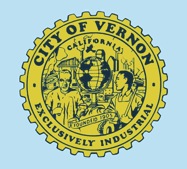 Vernon was founded and incorporated in 1905 by James J. and Thomas J. Furlong, both ranchers, and John B. Leonis, rancher and merchant. John Leonis was of Basque origin, coming to Southern California in 1880 to work for his Uncle Miguel Leonis whose original 1862 adobe dwelling in Calabasas was designated City of Los Angeles Cultural-Historic Monument #1. John Leonis established his own ranch on unincorporated county land southeast of Downtown. Recognizing the significance of the three major railroads running through the area, he convinced railroad executives to run spur tracks off the main lines and incorporated the adjacent three miles as an “exclusively industrial” city named after a dirt road, Vernon Avenue, crossing its center.
Vernon was founded and incorporated in 1905 by James J. and Thomas J. Furlong, both ranchers, and John B. Leonis, rancher and merchant. John Leonis was of Basque origin, coming to Southern California in 1880 to work for his Uncle Miguel Leonis whose original 1862 adobe dwelling in Calabasas was designated City of Los Angeles Cultural-Historic Monument #1. John Leonis established his own ranch on unincorporated county land southeast of Downtown. Recognizing the significance of the three major railroads running through the area, he convinced railroad executives to run spur tracks off the main lines and incorporated the adjacent three miles as an “exclusively industrial” city named after a dirt road, Vernon Avenue, crossing its center.
While waiting for industry to develop in the area, the founders of the city thought of marketing Vernon as a “Sporting Town.” In 1907, on land leased from Leonis, Entrepreneur Jack Doyle opened what was billed as the “longest bar in the world.” It had 37 bartenders, 37 cash registers and a sign advising “if your children need shoes, don’t buy booze.” Next door Doyle opened the Vernon Avenue Arena where 20-round world championship fights were held starting in 1908. Soon after, the Pacific Coast (baseball) League built a ballpark with its left field corner abutting Doyle’s bar and its own entrance into the park. The Vernon Tigers won three Consecutive league pennants. Last call for Doyle’s Bar was June 30, 1919 when over 1,000 people swilled their last pre-Prohibition drink. The chamber of commerce now sits atop Doyle’s onetime empire.
After 1919, Vernon went back to being exclusively industrial. Two giant stockyards, one owned by John Leonis, opened with meat packing quickly becoming Vernon’s signature industry. Twenty-seven slaughterhouses lined Vernon Avenue from Soto Street to Downey Road until the late 1960s. Said one longtime Boyle Heights
Resident, “we could smell Vernon in the evenings at our home.”
In the 1920s and 30s, heavy industries such as steel (U.S. and Bethlehem), aluminum (Alcoa), glass (Owens), can-making (American Can) and automobile production (Studebaker) grew in the City. The 1940s and 50s added aerospace contractors (Norris Industries), box and paper manufacturers, drug companies (Brunswig), and food processors (General Mills, Kal Kan). Giant meat packers (Farmer John and Swift) continued to grow. A strong, unionized labor force meant excellent middle class incomes for thousands of families.
In 1932, the City differed with Southern California Edison over industrial rates for Electricity, John Leonis orchestrated a Vernon bond measure to authorize the construction of the city’s own Light & Power plant, which is still operational today. Low-cost power and water, along with low taxes, attracted businesses to Vernon. Later, economical factors including, the free flow of capital and labor across borders had, by 1980, utterly transformed Vernon’s industrial face.
The City’s signature businesses, the slaughterhouses, relocated. Lower-cost producers in the East and Midwest reduced meat packing plants from 27 to today’s two. Bethlehem and US Steel competed unsuccessfully with European and Asian suppliers. Studebaker and American Can are closed. Defense cutbacks negatively impacted Alcoa and Norris industries. Today smaller industrial/commercial establishments including fashion design, garment-making, film production, electronics, and waste recycling are characteristic of the business community in Vernon.
by Pete Moruzzi, 1997.



